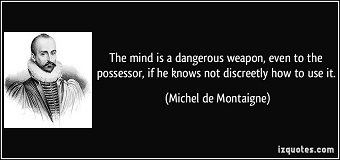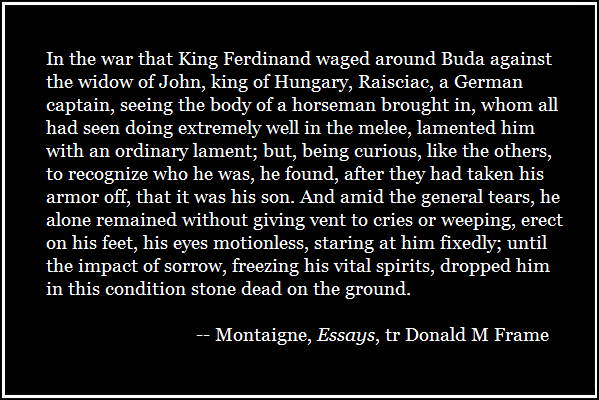[by Mark Safranski, a.k.a. “zen“]

“….Instead of softening their feet with shoe or sandal, his rule was to make them hardy through going barefoot. This habit, if practiced, would, as he believed, enable them to scale heights more easily and clamber down precipices with less danger.”
– Xenophon, The Polity of the Lacedaemonians
“Be quiet! In your position, it is your job to create a place of comfort and home for the students who live in Silliman! Then why the fuck did you accept the position? Who the fuck hired you? You should step down! If that is what you think of being headmaster, you should step down! It is not about creating an intellectual space! It is not!”
– Jerelyn Luther, the Shrieker of Yale
“I personally am tired of hearing that first amendment rights protect students when they are creating a hostile and unsafe learning environment for myself and for other students here.”
– Brenda Smith-Lezama, Vice President of the Missouri Students Association
Much has been written this week of the protests at Mizzou and Yale universities now sparking more absurd copycats elsewhere. Pundits have covered the dangerous illiberalism of campus political correctness and speculated that the students are the result of a generation of helicopter parenting. There were earlier essays recently on the “coddled” nature of elite university students generally and skewered Ivy League students in particular as the products of a deeply flawed, intellectually shallow,”meritocratic” rat race that serves as the gateway to the nation’s elite. There have also been conservative suggestions that the students lack the maturity to vote and a furious counterattack by social-justice faction lefties defending the students and their authoritarian anti-free speech “safe space” ideology.
While all interesting and moderately important, I don’t think any of this gets to the heart of the matter.
Up until today, every society in history has had a process, formal or informal, to prepare the next generation of leadership and inculcate virtues in them that would assure their society’s cultural continuity and physical survival. The ancient Chinese mandarinate was based on mastery of Confucian classics; the British Empire had its public schools and storied regiments where the sons of the gentry and peerage bonded; the samurai and daimyo of Tokugawa Japan continued to uphold bushido and cherish antique tactics in warfare centuries after Japan’s unification made such things more ritual than reality.
The definitive example of an educational rite of passage from student to member of the ruling class however, remains the Agoge of ancient Sparta. Established, according to Spartan legend, by the semi-mythical law-giver Lycurgus, the agoge (“the upbringing”) existed to mold Spartan boys through a ferocious training regime into the hoplite soldier-citizens who comprised the social apex of Sparta’s militaristic oligarchy. The agoge ceaselessly battered the students with physical exertion, corporal punishment, exposure to the elements and hunger in a bid to harden them in mind and body. There’s much about life under the agoge that moderns, even admirers of classical Greece, would find distasteful or even appalling, but it was very effective at inculcating that ascetic toughness, communal discipline, martial prowess and laconic wit that Spartans prized. For at least three centuries, the agoge helped sustain Sparta’s qualitative military edge and its hegemony over the Greek world and subsequently, its political independence for two centuries more. Not a record that was frequently matched in history.
America too has a system of education to prepare – or rather, certify – our future business, academic, judicial and political leaders based on matriculation at a small number of highly selective, elite universities and liberal arts colleges. Broadly speaking, this includes roughly the top 100 higher education institutions ranked by US News & World Report and narrowly, for filling the very top tiers of finance, law and government service, the Ivy League plus a handful of comparable schools. This would place Mizzou at the bottom of the barrel of our elite education system while Yale is at the very pinnacle. The kids going to exclusive, elite, universities are very bright for the most part, but even more so they are wealthy.
This upper class status includes the campus protestors screaming loudest about their wretched oppression. The hunger striker of Mizzou’s father is a multi-multi-millionaire while the Shrieker of Yale reportedly comes from the relative poverty of her parents $750,000 home. The aggressive authoritarianism on display at Yale, Mizzou, Amherst, Dartmouth or Claremont is less the “Rage of a Privileged Class” than the petulant tantrum of the 1%. In other words, despite their heroic efforts at a public pathos orgy of political correctness to portray themselves as victims in grave danger as they bullied and assaulted professors other students, these are spoiled rich kids used to getting their way, pitching an unholy fit to get undeserved power over others who disagree.
However obnoxious and unlikable these petty tyrants are or how totalitarian their demands to end free speech and academic freedom, fire and expel all their critics or put social-justice commissars in charge of every university department, they didn’t educate themselves. The students embody, perhaps in a more militant form, what they were taught. The problem isn’t that this year has a random surplus of student radicals, or that sinister racist conspiracies exist in the administrations of our most left-wing universities as protestors claim or that these helicoptered students are all psychologically fragile waifs raised in a culture of self-love and psychodrama. No, the problem is that the system to educate our future leaders tends to inculcate deep hostility and loathing toward their fellow Americans, extolls anti-empirical, witch-hunting dogmatism as a virtue while rewarding narcissism and anti-social aggression in interpersonal relations. This needs to change.
We have built an American anti-Agoge that cultivates values, ethics and habits in future leaders that are politically repulsive in their authoritarian rejection of Constitutional rights and are antithetical to ruling wisely or well. At times they would seem to conflict with a life as a functionally competent human being. Half of all Yale students in this pressure-cooker require at least some mental health counseling. This is an astounding statistic. Imagine if Polybius or Livy had written that half of the sons of the Patrician class were at least slightly mad. A toxic ruling class that is certain that they have been victimized by the citizens they govern and who lack the normal resilience to withstand minor stresses of life without concocting conspiracy theories or taking to their bed is a recipe for disaster. In a liberal democratic state such as ours, dependent as it is on the values of an open society to function politically, this state of affairs is a sign of political decay and creeping oligarchy.
What is to be done?
We did not arrive at this juncture overnight and fixing a fundamentally broken academic culture will take time, but here are a few simple suggestions to start.
- Legislation to Secure Academic Freedom, Due Process and Free Speech on Campus: This will defang the PC bullies, social justice warriors and their allies in university administration by hamstringing their ability to coerce and punish dissent. Obviously, this will be easier in public universities but these provisions could be attached to receiving Federal funds, including guaranteed student loans.
- Draconian Reduction of University Administrative Positions relative to Tenured Faculty: This will save a great deal of money better spent elsewhere in by axing bureaucracy while de-funding and disempowering the diversity commissariat on campus that is the source of much illiberal mischief. Again, this is a matter more for state level action initially.
- Restore a Core Undergraduate Canon rooted in Real Courses in Real Academic Fields: This will reduce the Melissa Click problem of academic sinecures for full-time radical political activists posing as professors with Fifty Shades of Gray “scholarship”. The money saved by getting rid of an army of administrators in #2 leaves a lot of room to hire mathematicians, biologists, historians, economists, physicists, philosophers and linguists who earned a doctorate in something real.
- Require Elite universities Receiving Federal Funds to allocate 20% of their Student Body to Students from Middle-Class, Lower Middle Class and Working Class backgrounds, Geographically Balanced: I have mixed feelings about this in principle, but it would definitely break up the overwhelming UC-UMC Superzip monoculture at our gateway institutions and bring new talent and perspectives into our ruling class that the university administrators at present work extremely hard to systematically exclude. It will also increase social mobility and provide competition for the progeny of our game-rigging “meritocratic” elite.
.
None of these will usher in a utopia. Much of radical academia will muddle through doing what they have been doing until retirement, but the system itself will be on a trajectory for better health rather than for getting steadily worse.








